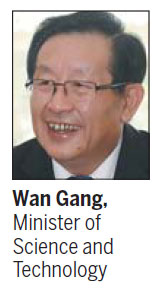High-tech companies produce goods for civilians
Updated: 2012-11-04 08:40
By Cheng Yingqi in Shanghai (China Daily)
|
|||||||||||
China's advanced technology industry has been manufacturing more products for civilian use, Minister of Science and Technology Wan Gang said on Saturday.
"China's companies that take on the work related to space flight, lunar exploration, earth observation and deep diving system - most of them evolved from research institutes after the reform and opening-up - now have more than 70 percent income coming from the civil sector," Wan said.
 |
Wan made the speech on the opening ceremony of Pujiang Innovation Forum. Since its establishment in 2008, the forum has been serving as a platform to promote exchange in innovation, and to facilitate interaction among government departments, enterprises, universities and research institutes.
"Advanced science and technology development plays a major role in industrial revolution," Wan said.
Wan added that future sci-tech innovation emphasizes on enterprises' active participation.
"We will create an environment for fair competition for enterprises, and support innovative activities of small- and medium-sized enterprises. We should enhance sci-tech policy to encourage enterprises to establish their own research and development (R&D) institutions, and encourage R&D talents to participate in business sector research," he said.
In 2011, the domestic sci-tech market volume reached 478 billion yuan ($76.53 billion), with 172,000 patents for new invention.
Wan said China welcomes foreign R&D institutions.
He said that by October, there were more than 4,500 foreign institutions in China, and 467 of the Fortune 500 Global companies have their own R&D institutions in China. Some companies, like IBM and General Electric, have thousands of researchers working in numerous research centers in China.
"These institutions are part of our innovation force. As usual, we will support them with fair environment, and we encourage these institutions to play a part in our government-sponsored projects," Wan said.
Between 2010 and 2011, Beijing's high-tech companies invested 200 billion yuan in R&D, and 25 State-owned institutions have built a platform to share their science resources with enterprises.
"To integrate science resources in Beijing, we have strengthened the management of sci-tech planning, which both allows failures in research, and has evaluation system that supervises the research output," said Chen Gang, member of the standing committee of CPC Beijing.
"From technology incubators to technology transfer, we keep improving our service system, and innovation patterns spring up, bringing the city more than 80,000 employment opportunities," Chen said.
In 2011, the country's spending on R&D stood at 816 billion yuan, out of which 74 percent was raised by enterprises. And the overall number of R&D-related jobs enjoyed 12 percent annual growth for 10 consecutive years, bringing its total number to 2.8 million in 2011.
Jeffrey Lehman, vice president of New York University Shanghai, added that research universities are also vital for the creative landscape.
In contrast to enterprises, research universities should pour more efforts on researches that cannot be carried out by enterprises, Lehman said.
"Research universities are an essential part of innovation ecology," he said, adding that the job of universities is to accomplish some work that can "light up a large area", but not making a small point "less dark".
chengyingqi@chinadaily.com.cn
Related Stories
China's 10 years of technology innovation 2012-11-01 16:36
Civil aircraft technology research center settles in Changping Park 2012-10-25 11:40
Villages benefit from adopting new technologies 2012-10-18 08:06
Experts: Despite China's efforts, technology constraints could curb shale gas development 2012-09-28 07:49
How will China become world technological power 2012-09-25 11:18
Today's Top News
President Xi confident in recovery from quake
H7N9 update: 104 cases, 21 deaths
Telecom workers restore links
Coal mine blast kills 18 in Jilin
Intl scholarship puts China on the map
More bird flu patients discharged
Gold loses sheen, but still a safe bet
US 'turns blind eye to human rights'
Hot Topics
Lunar probe , China growth forecasts, Emission rules get tougher, China seen through 'colored lens', International board,
Editor's Picks

|

|

|

|

|

|





